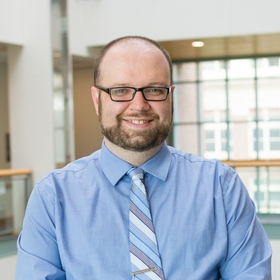

5-136 MCB
420 Washington Ave SE
Minneapolis, MN 55455
United States
United States
Ian
MacFarlane
My research focuses on the professional development of helping professionals, with an emphasis on genetic counselors. My primary research line is about clinical supervision and I augment this with secondary lines in DEIB/social justice, admissions processes, and competency assessment.
Research statement
My primary research area is professional development of clinicians, with an emphasis on the role of supervision and clinical training. Graduate students learn the theory of how to perform healthcare in the classroom, but like learning to drive, the books can only help so much. Clinical supervisors play the critical role of guiding novice practitioners through the process of gaining experience, bouncing back from mistakes, and honing clinical skills. At the same time, supervisors serve as gatekeepers to the profession and have to ensure students are capable of performing competent work. The tension between the roles of talent development and protecting patients' well-being is felt by both supervisors and their supervisee, which can make the relationship dynamics between them complex.
Much of my work in this area has focused on the field of genetic counseling, where practitioners work with patients to help them “understand and adapt to the medical, psychological and familial implications of genetic contributions to disease” (National Society of Genetic Counselors). Formal research on supervision in this field is a fairly recent endeavor, and I’ve been a part of research groups that are developing supervision competencies, testing models of clinical practice and supervision, and measuring clinical outcomes. Ultimately, my lab’s goal is to help create empirically supported methods of teaching and providing supervision to genetic counselors in training that promote student well-being, inclusion, and clinical excellence, while reducing the risk of burnout and compassion fatigue to both students and supervisors.
As we work toward this primary goal, we also study how to best assess competence and clinical excellence, how to validly and equitably select applicants for admissions to graduate programs, and how to improve cultural engagement among educators, trainees, and practitioners. This work involves creation of measures, development of best practices, and incorporation of scholarship of teaching and learning.
Selected publications
Morales, M., Redlinger-Grosse, K., & MacFarlane, I. M. (2023). Cross-disciplinary collaboration for supervisor training: Reaping the benefits of a relationship-based approach. The Clinical Supervisor, 42, 26-44. https://doi.org/10.1080/07325223.2022.2132339
Keppers, R., McCarthy Veach, P., Schema, L., LeRoy, B. S., & MacFarlane, I. M. (2022). Differences in genetic counseling student responses to intense patient affect. Journal of Genetic Counseling, 31, 398-410. https://doi.org/10.1002/jgc4.1505
MacFarlane, I. M., Johnson, A.*, & Zierhut, H. (2021). Changes to the genetic counseling workforce as a result of the COVID-19 pandemic. Journal of Genetic Counseling, 30, 1244-1256. http://dx.doi.org/10.1002/jgc4.1488
Mills, R., MacFarlane, I. M., Caleshu, C., Ringler, M. A., & Zierhut, H. (2021). Genetic counselor experiences with telehealth before and after COVID-19. Journal of Genetic Counseling, 30, 999-1009. http://dx.doi.org/10.1002/jgc4.1465
Redlinger-Grosse, K., MacFarlane, I. M., Cragun, D., & Zierhut, H. A. (2021). A Delphi study to prioritize genetic counseling outcomes: What matters most. Journal of Genetic Counseling, 30, 676-692. https://doi.org/10.1002/jgc4.1352
Stoddard, A., McCarthy Veach, P., MacFarlane, I. M., LeRoy, B., & Tryon, R. (2021). Genetic counseling student demographics: An empirical comparison of two cohorts. Journal of Genetic Counseling, 30, 211-228. https://doi.org/10.1002/jgc4.1312
Wallgren, A., McCarthy Veach, P., MacFarlane, I. M., & LeRoy, B. S. (2021). Content analysis of Journal of Genetic Counseling research articles: A multi-year perspective. Journal of Genetic Counseling, 30, 774-784. https://doi.org/10.1002/jgc4.1373
Greve, V., McCarthy Veach, P., Redlinger-Grosse, K., MacFarlane, I. M., & LeRoy, B. S. (2020). Genetic counselor and proxy patient perceptions of genetic counselor responses to prenatal patient self disclosure requests: Skillfulness is in the eye of the beholder. Journal of Genetic Counseling, 29, 894-909. https://doi.org/10.1002/jgc4.1190
Senter, L., Austin, J., Carey, M., Cho, M., Harris, S., Linnenbringer, E., MacFarlane, I. M., Pan, V., Quillen, J., Wynn, J., & Hooker, G. (2020). Advancing the genetic counseling profession through research: Identification of priorities by the NSGC Research Task Force. Journal of Genetic Counseling, 29, 884-887. https://doi.org/10.1002/jgc4.1330
Zierhut, H. A., MacFarlane, I. M., Ahmed, Z., & Davies, J. (2018). Genetic counselors’ experiences and interest in telegenetics and remote counseling. Journal of Genetic Counseling, 27, 329-38. http://dx.doi.org/10.1007/s10897-017-0200-x
MacFarlane, I. M., McCarthy Veach, P., Grier, J. E., Meister, D. J., & LeRoy, B. S. (2016). Supervision experiences of genetic counseling students with differing levels of trait anxiety: A qualitative investigation. Journal of Genetic Counseling, 25, 742-766. http://dx.doi.org/10.1007/s10897-016-9953-x
Finley, S. L., McCarthy Veach, P., MacFarlane, I. M., LeRoy, B. S., & Callanan, N. (2016). Genetic counseling supervisors’ self-efficacy for select clinical supervision competencies. Journal of Genetic Counseling, 25, 344-358. http://dx.doi.org/10.1007/s10897-015-9865-1
Redlinger-Grosse, K., McCarthy Veach, P., Cohen, S., LeRoy, B. S., MacFarlane, I. M., & Zierhut, H. (2016). Defining our clinical practice: The identification of genetic counselor outcomes utilizing the reciprocal engagement model. Journal of Genetic Counseling, 25, 239-257. http://dx.doi.org/10.1007/s10897-015-9864-2
Lee, W., McCarthy Veach, P., MacFarlane, I. M., & LeRoy, B. S. (2015). Who is at risk for compassion fatigue? An investigation of genetic counselor characteristics. Journal of Genetic Counseling, 24, 358-370. http://dx.doi.org/10.1007/s10897-014-9716-5
Hartmann, J., McCarthy Veach, P., MacFarlane, I. M., & LeRoy, B. S. (2015). Genetic counselor perceptions of genetic counseling session goals: A validation study of the Reciprocal-Engagement Model. Journal of Genetic Counseling, 24, 225-237. http://dx.doi.org/10.1007/s10897-013-9647-6
Education and background
- BA - Psychology with minor in family violence prevention - University of Minnesota - 2006
- MS - Counseling and Student Personnel Psychology - University of Minnesota - 2008
- PhD - Counseling Psychology - University of Minnesota - 2013